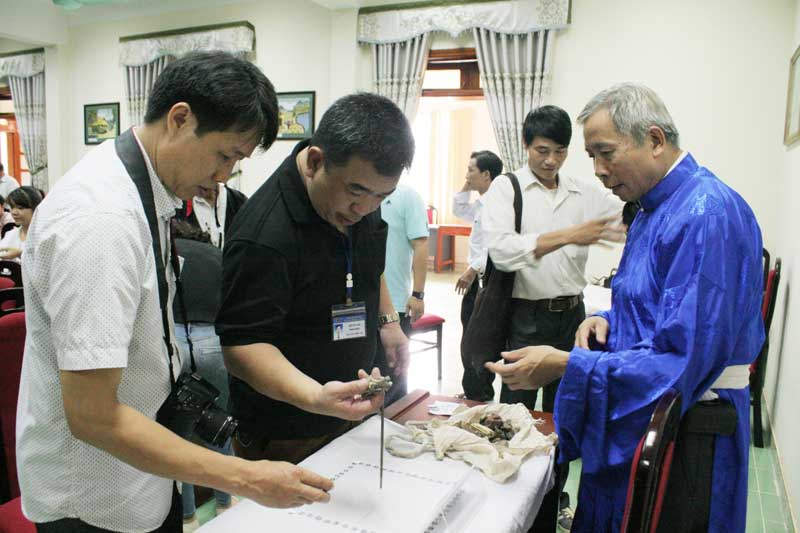
HBO – Mo is used by Muong ethnic people to practice a variety of rituals in daily life. There are 23 Mo-related rituals in four main groups, namely the rituals praying for happiness and prosperity, the rituals to summon souls, the rituals to eliminate devils and pray for peace and health, and funeral rituals. Therefore, Mo rituals go closely with one person from birth, marriage, peace, health, to death.

Officials
from the Hoa Binh Provincial Department of Culture, Sports and Tourism (DoCST) are
reviewing Tui Khot (ritual bags) of thay mo, or sorcerers in Kim Boi district.
In the
Hoa Binh Culture in local Muong Hoa Binh ethnic area, Mo has been formed,
thrived and is on path to becoming a national intangible cultural heritage.
Mo
Muong holds unique human value. Mo reproduces the mankind’s history in the
legends of earth, water, fire, Cun Can’s marriage (Cun Can was the head of a
Muong ethnic area), reflecting the development of mankind’s society, and their
creativity in their lives. Mo Muong also tells lessons about community life and
society, such as the recitations about using Chu Dong tree to build house,
setting fire on the house of the Muong ethnic people’s God King Dit Dang,
taking care of animals, flower garden in Coi Mountain. They are lessons about
solidarity, ingratitude, sufferings in wrong love affairs. Mo Muong has a
long-lasting life because it comprises all folk cultural values of the ethnic
Muong people, including fork literature, folk singing, folk rituals telling
about people’s knowledge and behavior.
Mo
Muong is the essence of experience in labour, production, cultural behavior and
philosophy of life, reflecting the love of life, people and hometown. It shows
the courage and personality of the Muong ethnic people and
land of
Muong Hoa Binh.
Mo Muong reflects the characteristics, the soul and moral principles of the
Muong ethnic minority people. Over the past time, generations of Muong people
have preserved, passed down and promoted Mo Muong values in a sustainable
manner, giving vitality and inspiring capability of the intangible cultural
heritage.
According
to statistics of the DoCST, the province is home to 241 eligible sorcerers. They are the "living archive”
holding especially important values in exploring and summarizing the unique
cultural values of Mo Muong.
Bui Van
Keng, a sorcerer in Cuoi Ha commune,
Kim Boi district said the number of sorcerersreduced sharply, Mo rituals did, too. Most of the sorcerers are old. They have difficulties in passing down the
rituals because young people cannot learn or don’t have passion to learn. He
expressed his hope that authorities will collect documents on
Muong
Mo,
keep them in record to pass down to the next generations.
In
order to protect and promote the Muong ethnic culture in general and Mo Muong
in particular, in early 2017, Muong ethnic letters were announced. The DoCST
developed projects to select contents of Mo Muong cultural heritage to include
in teaching programmes at schools, and to preserve Mo Muong values.
Compilation
of books on Mo Muong is also underway, using the new letters. Relevant bodies
prepare resumes, propose legal framework to preserve the values of the Mo Muong
cultural heritage./.
With an increasingly vibrant and widespread emulation movement aimed at building cultured residential areas and cultured families, Yen Thuy District has been making steady progress toward improving both the material and spiritual well-being of its people, while fostering a civilized, prosperous, beautiful, and progressive community.
Once lacking recreational spaces and community facilities, Residential Group 2 in Quynh Lam Ward (Hoa Binh City) has recently received attention for the construction of a new, spacious, and fully equipped cultural house. The project followed the model of state support combined with public contributions in both labor and funding.
The "All people unite to build cultural life" movement, which has been effectively integrated with Kim Boi district’s socio-economic development goals, is fostering a lively spirit of emulation across local residential areas, hamlets, villages, public agencies, and enterprises. In addition, through the initiative, traditional cultural values are being preserved and promoted, while community solidarity and mutual support in poverty reduction and economic development are being strengthened.
A working delegation of the Hoa Binh provincial People’s Committee led by its Permanent Vice Chairman Nguyen Van Toan on June 11 inspected the progress of a project to build the Mo Muong Cultural Heritage Conservation Space linked to tourism services in Hop Phong commune, Cao Phong district.
Born and growing in the heroic land of Muong Dong, Dinh Thi Kieu Dung, a resident in Bo town of Kim Boi district, in her childhood was nurtured by the sweet lullabies of her grandmother and mother. These melodies deeply imprinted on her soul, becoming an inseparable part of her love for her ethnic group's culture. For over 20 years, this love for her hometown has driven Dung to research, collect, and pass down the cultural values of the Muong people to future generations.
In the final days of May, the Ethnic Art Troupe of Hoa Binh Province organized performances to serve the people in remote, mountainous, and particularly disadvantaged areas within the province. These were not just ordinary artistic shows, but they were the meaningful journeys aimed at spreading cultural values, enhancing the spiritual life of the people and contributing to the preservation of ethnic minority cultural identities.



